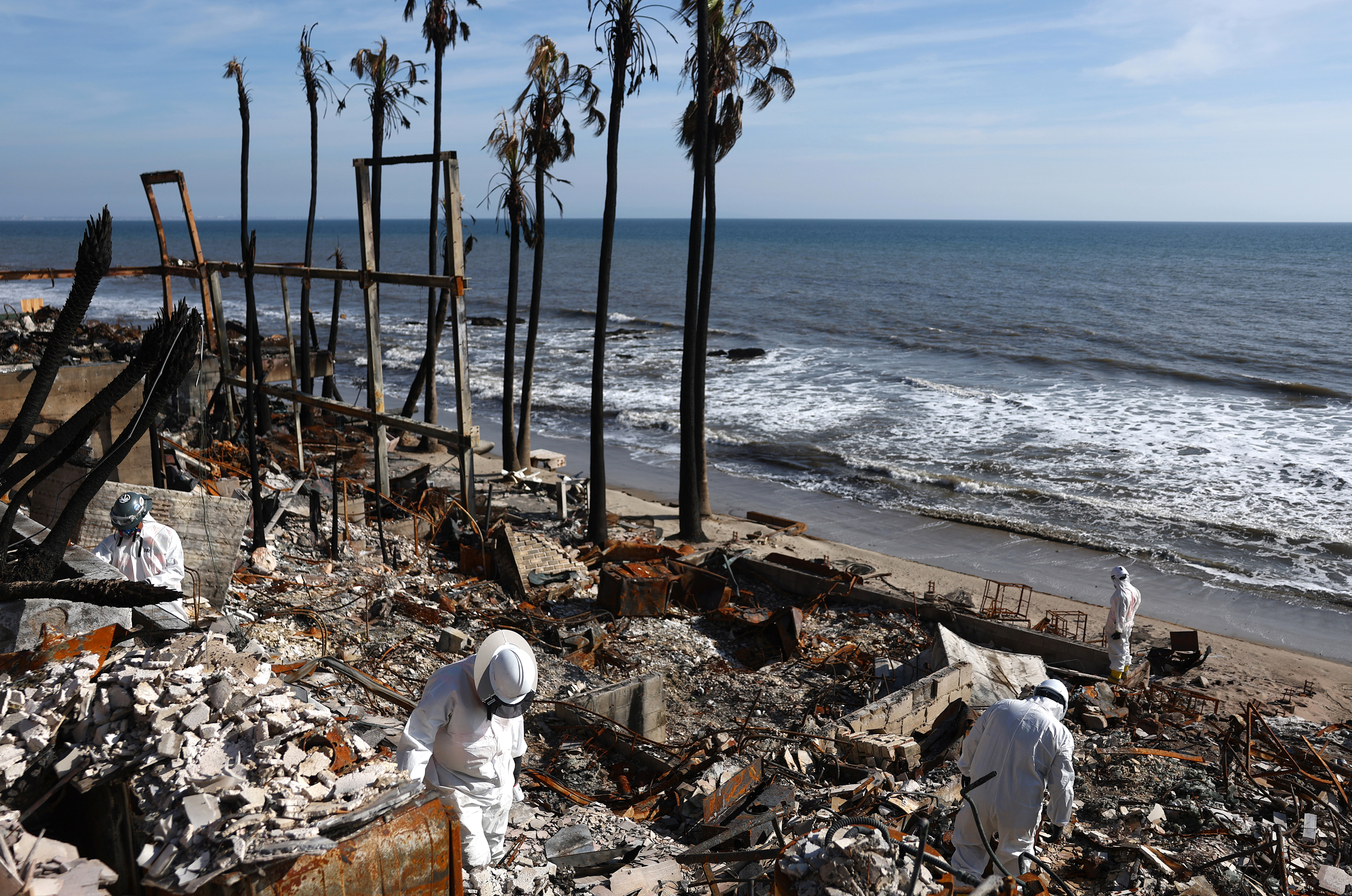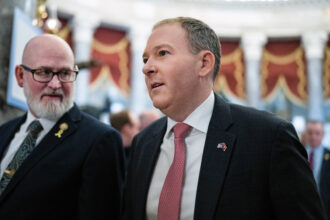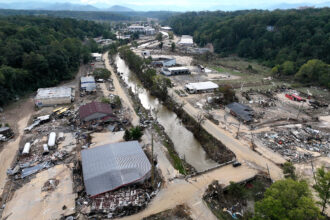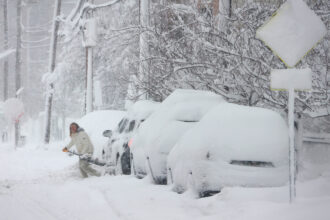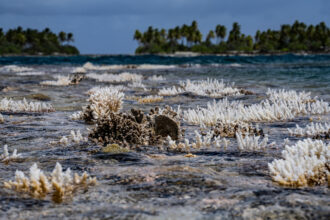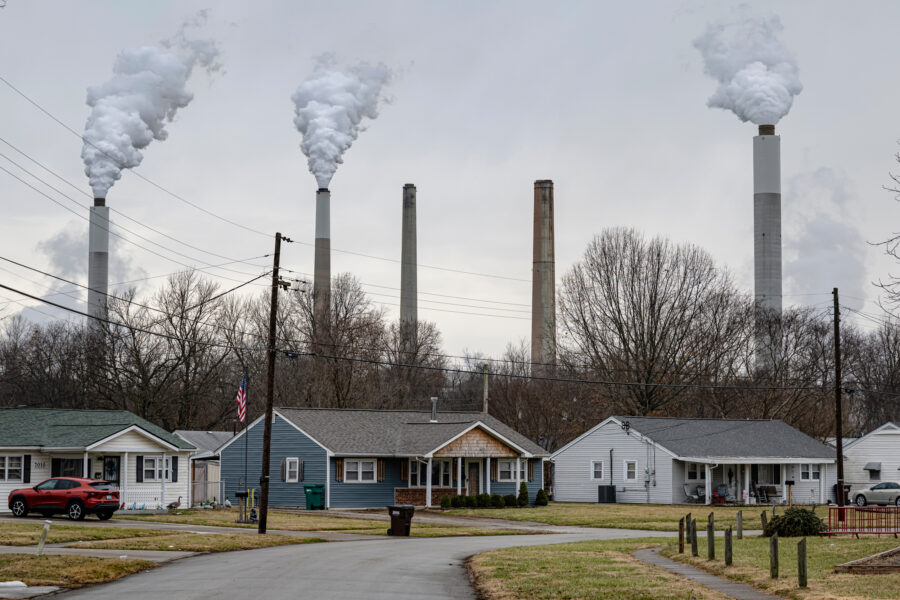From our collaborating partner “Living on Earth,” public radio’s environmental news magazine, an interview by host Steve Curwood and Paloma Beltran with Christine Todd Whitman, a former administrator of the U.S. Environmental Protection Agency and a former Republican governor of New Jersey.
The Trump administration has hit the Environmental Protection Agency with major changes. Many workers have been fired, some rehired, and amid the confusion billions of dollars face clawbacks. The new EPA administrator, Lee Zeldin, has promised to slash regulations to shreds.
President Donald Trump has taken the U.S. out of the Paris climate agreement. And the scale of the efforts to cut EPA spending and roll back rules is unprecedented.
Christine Todd Whitman was the first woman governor of New Jersey and led the EPA as a Republican with a comparatively modest conservative agenda under President George W. Bush. She’s a cofounder of Forward, a new political party to appeal to centrists who feel left out by both Republicans and Democrats.
This interview has been edited for length and clarity.
STEVE CURWOOD: How do you feel about the country’s direction now when it comes to climate and the environment?
CHRISTINE TODD WHITMAN: I think we’re going totally the wrong direction. There’s no question in my mind, the charge of the [EPA] is to protect human health and the environment, and that’s what it does.
It’s the one that does the research to see what is acceptable for human consumption on some of these chemicals and things. It is the one that’s there when there’s a disaster and helps clean up. I mean, in the Maui fires in Hawaii that destroyed an entire community, it was EPA that went there and helped with the cleanup, helped identify where there were hot spots, where there were problems, worked to lay out a map of the totally destroyed buildings. It worked to ensure the constant monitoring of air quality, so that people would know what they were getting into when they went back to their homes, and helped ensure the cleanup of a whole lot of lithium batteries that were stored there.
That’s the kind of thing it does when it responds to a crisis. And we’re the ones that respond to crises everywhere.
EPA is also the one that’s out front saying, “You’ve got to be careful about this, that, or the other.” It’s monitoring the quality of water, monitoring the air quality. And Mother Nature, as I think we’re learning, doesn’t care anything about geopolitical bounds.
When I was governor of New Jersey, I could have closed down every manufacturing plant in the state and still had problems with the air quality standard because of air transport from the coal mining in Kentucky and West Virginia. We’ve seen this with storms, with water runoff, things like that. It doesn’t stay in one place. It affects everybody, and that’s why you have to have some national standards. It can’t just be state to state. States can go beyond what EPA says is safe. They can make it stricter—that’s fine—but they can’t go below what the agency says. And the agency has incredible scientists and a depth of knowledge that no individual state really has.
PALOMA BELTRAN: What do you make of what we’ve done as a country in the 20-plus years since you’ve left your role as EPA administrator?
WHITMAN: Well, we’ve had forwards and backwards. I mean, we did pretty well under the last Democratic administration, under Biden’s administration, but previous to that, the Trump administration had already started cutting and starving the agency for money. And unfortunately, many of those with the real depth of knowledge, the institutional knowledge that you need, because these things are complicated, left. There’s still quite a few of them there now, but I think they’re leaving because it’s clear this administration does not want an Environmental Protection Agency.
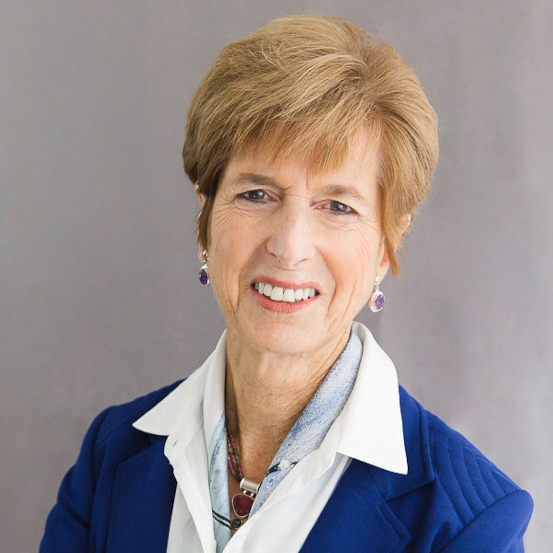
We’re the only industrialized country in the world that does not have the environment as a recognized cabinet position. EPA is only an agency. We were treated as a cabinet level, and I attended all the cabinet meetings, that went without saying, but we could never make that extra step. You could never get a clean bill through that would say it’s a cabinet position.
So we’ve always been a little bit hesitant about regulations, and it’s easy to hate the agency because it’s a regulatory agency, so it’s either telling people to do something they don’t want to do and spend extra money, or telling them to stop doing something that was beneficial to them. So it’s easy to hate the agency, but you have to trust that they’re doing what’s in the best interests of the greatest number of people to keep us safe and healthy.
BELTRAN: Let’s just say for a moment that you were president of the United States and could set the policy for the EPA. What direction do you think we should be heading in? What major environmental issues in the U.S. do you think the EPA ought to be addressing right now?
WHITMAN: If we haven’t figured out that Mother Nature is a little mad at us right now and is kind of sending the message that you guys may think you’re smart and capable, but I’m in charge, then we really are deaf and dumb to this.
We have to take climate change seriously. It’s costing us lives. It’s costing us livelihoods, businesses, billions of dollars, and destabilizing a number of countries around the world. It’s not good for us when these countries are destabilized like that, when you start to have violence, because people are frustrated and angry, and so we need to take this issue seriously.
I have said for a long time that if you want to get it down to one particular issue, that quantity and quality of water is the number one environmental issue, but that’s all tied up in climate change as well.
BELTRAN: You are the cofounder of the Forward Party, a centrist third party that aims to look forward from this time of partisan polarization. To what extent do you see this party as a possible option for conservatives who don’t feel their beliefs align with that of the Make America Great Again crowd?
WHITMAN: It’s a home for them. It’s a home for people on both sides, from both parties, who feel that they’ve been displaced, that their parties have left them. The far left on the Democrats and the far right on the Republicans, because we’re building from the ground up.
We’re serious about a third party. It’s not like the third parties that we have seen traditionally, which run just presidential candidates and there’s no infrastructure below so the minute the election is over, that’s it. They’re gone. Or parties like the Liberal Party or the Green Party, which are about just a certain subset of issues.
We’re about putting people in office who will represent their constituents. We don’t have a platform that says you have to be pro-gun or anti-gun, or pro-abortion or anti-abortion. You have to sign a pledge that says you’ll uphold the rule of law, respect the Constitution, work with anyone to solve problems, create a safe space to discuss the controversial issues, and open the process so that anyone who is legally able to vote, can vote.
And then we have principles of respect for one another, for protecting our democracy, for economic opportunity. We want our candidates to decide, “What are the issues that are most important to my constituents? What matters here?” I mean, what’s important in Arizona is not the same as what’s important in New Jersey. They’re very different, and we should recognize that.
But unfortunately, the two major parties don’t do that. They have a very strict set of policies, and you have to adhere to those. And if you don’t vote the way they want you to vote, then they’ll come after you in a primary, they’ll stop funding you, they’ll take away committee assignments.
We hear every day how many people there are in Washington who really don’t like everything that’s going on, but are afraid to do anything about it, because they’re afraid of the repercussions. That’s not how we should be operating. And so what we’re saying to those people is, “Look, join us. We’ll get you volunteers, we’ll help you with issue research, we’ll help you with getting money and we’ll have your back.”
This story is funded by readers like you.
Our nonprofit newsroom provides award-winning climate coverage free of charge and advertising. We rely on donations from readers like you to keep going. Please donate now to support our work.
Donate NowCURWOOD: How healthy is our democracy? The man in the White House at one point campaigned saying that, “You’ll never have to vote again.” Some people say that it’s time to vote while we still can. How do you feel about the present state of the way the law and the Constitution is being viewed by the people who seem to be in power right now?
WHITMAN: Our democracy is teetering on a knife’s edge. We held in the last go round of the Trump administration because he had people there who were sensible and who were able to stop some of the most extreme things that he wanted to do. Now he’s filled the administration with sycophants, and they’re not going to oppose him. They’ve learned that the best way to motivate Donald Trump is to praise him and to do it publicly.
But the thing that bothers me the most is the absolute by-the-book dictator approach, which is you start driving wedges between people. You start making people afraid of others who don’t look like them or don’t act like them.
It’s saying all immigrants are rapists or drug addicts and we’re in danger from them. It’s creating a world that is just so counter to what the United States has always stood for. I don’t hate Donald Trump, but I really deeply deplore what he’s doing to our country, and undermining the rule of law. He doesn’t seem to care about it; the Constitution is an inconvenient document.
He’s just going to go right ahead and do what he’s doing, and is starting to ignore the courts, really ignore them, and he already is, in a way. He’s pushed off a lot of decisions that have gone against him, and hasn’t paid penalties, but he’s never paid bills, so that’s not unusual, but he’s really undermining the public’s confidence in the courts and in the rule of law. Then we’re in a really dangerous spot. I don’t know what we do then.
CURWOOD: In other words, vote while we still can.
WHITMAN: Yeah, I would advise it. I mean, listen, democracy doesn’t ask a whole lot of us, but it does ask us to be engaged and at least vote, and we just haven’t been doing a good job of that.
BELTRAN: What have you heard from various voters? How do they feel about the trajectory that this country is on?
WHITMAN: On an everyday basis, people are just concerned about keeping a roof over their heads, being able to feed their family, being able to be treated with dignity and have the opportunity to move forward and succeed. And for too long, they feel that Congress and politicians have not listened to them, and that’s how Donald Trump got into office because he played to them. He said, “I hear you.” He’s the wrong person for them, because he may have heard them, but he doesn’t really care about the person who’s struggling. If you look at his tax policies, they’re all to benefit the rich. They don’t benefit the average wage earner.
Right now he’s saying, “Well, we might have a recession, not a big deal.” Maybe not a big deal if you have billions in the bank, but it’s a big deal to someone who is living right on the edge and paycheck to paycheck. So I think we’re going to have some buyer’s remorse coming.
After this election, our internet traffic at the Forward Party went up over 120 percent and our state organizations were seeing the same thing. People who are coming to them saying, “What can I do? Can I run? How do I do this? How do we stop what’s going on?” And you’re seeing more and more people leave the two major parties, the Republican and Democratic Party, and become independent, independently registered. And those are the people that we want to work with. They’ve got to start to get engaged and help us build a party that can push back against what’s going on.
About This Story
Perhaps you noticed: This story, like all the news we publish, is free to read. That’s because Inside Climate News is a 501c3 nonprofit organization. We do not charge a subscription fee, lock our news behind a paywall, or clutter our website with ads. We make our news on climate and the environment freely available to you and anyone who wants it.
That’s not all. We also share our news for free with scores of other media organizations around the country. Many of them can’t afford to do environmental journalism of their own. We’ve built bureaus from coast to coast to report local stories, collaborate with local newsrooms and co-publish articles so that this vital work is shared as widely as possible.
Two of us launched ICN in 2007. Six years later we earned a Pulitzer Prize for National Reporting, and now we run the oldest and largest dedicated climate newsroom in the nation. We tell the story in all its complexity. We hold polluters accountable. We expose environmental injustice. We debunk misinformation. We scrutinize solutions and inspire action.
Donations from readers like you fund every aspect of what we do. If you don’t already, will you support our ongoing work, our reporting on the biggest crisis facing our planet, and help us reach even more readers in more places?
Please take a moment to make a tax-deductible donation. Every one of them makes a difference.
Thank you,

